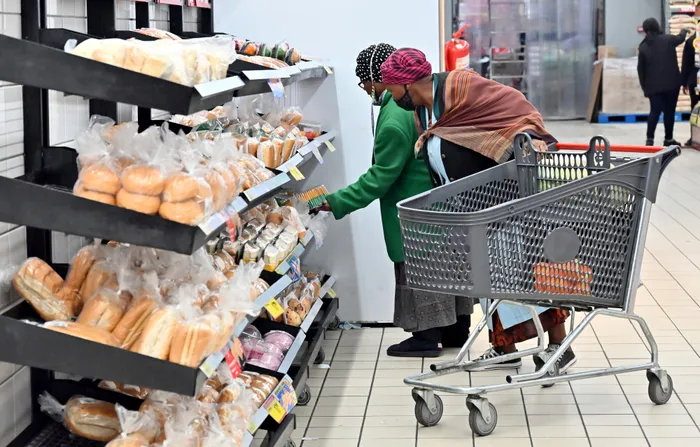Interest rates to stay high despite inflation plunging to 5-year low
INFLATION

Stats SA said the headline consumer price inflation (CPI) fell sharply by 0.5 percentage points to 2.7% in March from 3.2% in February, mainly on account of food and non-alcoholic beverages and fuel prices.
Image: Ayanda Ndamane/ Independent Newspapers.
CONSUMERS reliant on credit may have to endure an extended period of restrictive monetary policy before the South African Reserve Bank (Sarb) considers cutting interest rates later this year, despite recent data showing inflation has plummeted to its lowest level in nearly five years.
Data from Statistics South Africa (Stats SA) on Wednesday showed that inflation surprised on the downside and cooled for the first time in five months on the back of lower fuel and education.
Stats SA said the headline consumer price inflation (CPI) fell sharply by 0.5 percentage points to 2.7% in March from 3.2% in February, mainly on account of food and non-alcoholic beverages and fuel prices.
This better-than-expected inflation print marked the lowest reading since June 2020, falling below the lower bound of the Sarb’s 3–6% target range.
Even though inflation appeared contained, the Sarb last month decided to keep the policy rate unchanged at 7.5% on the back of more moving parts than usual, including a reweighting of the CPI and the proposed value-added tax (VAT) increases, as well as the oil price that reflected shifts in global markets.
Kristof Kruger, senior fixed income trader at Prescient Securities, on Wednesday said real interest rates were now meaningfully restrictive, increasing the probability of a dovish pivot from the Sarb even though there was widening room for policy easing.
“The April CPI print will be critical. If it confirms this trend, the Sarb could begin easing by November 2025, with markets already pricing a 50–75 basis points cycle. The main constraint remains the rand vulnerability, any sharp selloff could complicate the outlook,” Kruger said.
“The March CPI report has changed the tone. With inflation now comfortably below target and FRA [Forward Rate Agreement] markets responding accordingly, a window for Sarb easing has opened. Positioning for a shallow cutting cycle, especially in the front-end and belly of the curve, looks increasingly justified.”
Inflation has been a hot topic globally in the wake of Trump’s tariff war, prompting both the US Federal Reserve and the International Monetary Fund to prominently raise concerns recently around the potential impact on both global economic growth and inflation.
Inflation has fallen significantly, prompting discussions about potential rate adjustments. However, the Sarb's Monetary Policy Committee (MPC) maintains that sustained inflationary pressures continue to necessitate a cautious approach.
Stats SA said the core inflation rate, which excludes volatile items such as food, non-alcoholic beverages, fuel, and energy, dropped to 3.1%, the lowest since September 2021, easing from 3.4% in February.
On a monthly basis, consumer prices rose by 0.4% in March, the softest annual print since April 2021, after having slowed down from a 0.9% advance in February.
Reza Hendrickse, portfolio manager at PPS Investments, said inflation was unlikely to remain sub-3% going forward, and this could be something the MPC flags next month, in addition to significant global risks.
“With CPI currently below the bottom of the Sarb’s historic target range, and well below the mid-point, inflation is clearly not a problem in SA. Electricity is the only component of the CPI basket, which is and will remain a problem, given persistent above-inflation increases,” Hendrickse said.
“Although the situation remains fluid as posturing and negotiations continue among countries, we do expect some impact on both global growth and inflation. The impact on SA will be relatively muted however, and probably not enough for the Sarb to be overly concerned about delivering the one or two more cuts that the market is currently expecting.”
Housing rents, which were surveyed for the first quarter in March, increased by 2.9%, and earners' equivalent rent by 2.4%, compared with the fourth quarter of 2024.
Standard Bank Group head of South Africa macroeconomic research, Dr Elna Moolman, said rental inflation was a big part of the consumer inflation basket, and this was the second consecutive quarter in which rental inflation surprised to the downside.
“So this is clearly reflective of weakness in the residential rental market. Inflation pressure generally remains quite benign, and this vindicates the Reserve Bank's decision to cut interest rates since late last year,” Moolman said.
“This doesn't, however, necessarily remove all of the Reserve Bank's potential concerns around medium-term upside pressure on inflation from the global tariff developments and a weaker currency, so this doesn't necessarily guarantee further interest rate cuts in the short term.”
BUSINESS REPORT